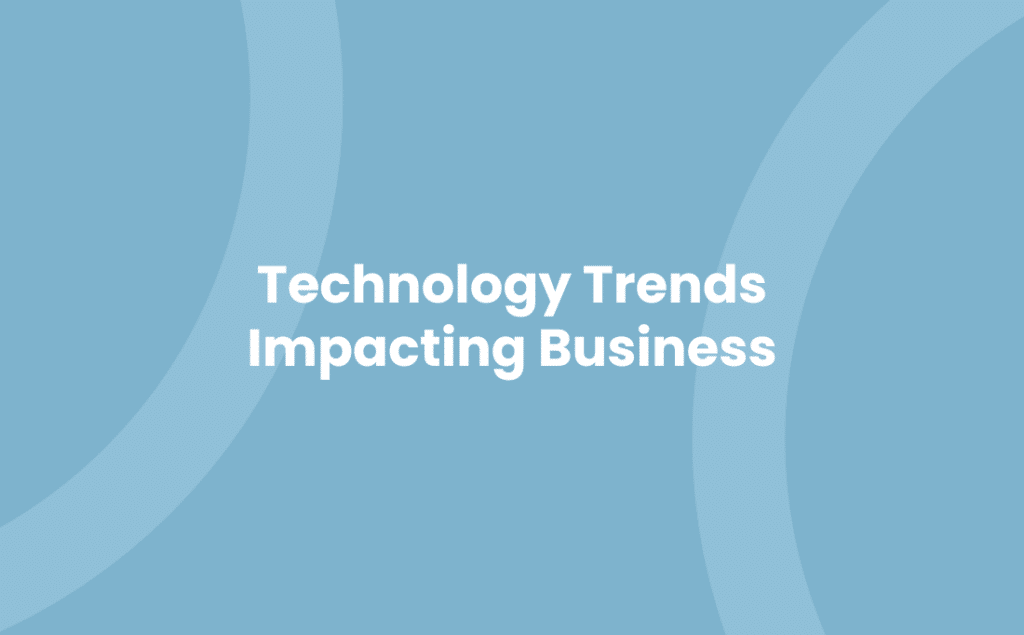Imagine standing on the precipice of a new era, where technology isn’t just an aid, but the driving force of change. Welcome to the world of digital transformation. It’s the buzzword that’s reshaping businesses, industries, and economies, and it’s happening right now.
In this ever-evolving digital landscape, staying up-to-date on the latest trends isn’t just beneficial‚ it’s crucial. From AI to blockchain, IoT to cloud computing, these aren’t just trends, they’re the future. So buckle up and let’s delve into the dynamic world of digital transformation technology trends, where innovation meets practicality and the only constant is change.
Understanding Digital Transformation Technology Trends
While embracing digital transformation, keeping a keen eye on tech trends is crucial. It helps you stay afloat in this fast-paced technology-driven world.
- Artificial Intelligence (AI): Undeniably, AI plays a pivotal role in today’s digital landscapes. It’s revolutionising several sectors, from healthcare to retail. You might interact with AI regularly, via chatbots on websites or perhaps voice assistants like Alexa or Siri.
- Blockchain Technology: Initially closely associated with cryptocurrencies, blockchain now expands far beyond that. Known for its heightened security and transparency, numerous industries such as finance, logistics, and even healthcare are adopting it.
- Internet of Things (IoT): IoT continues to foster seamless connections between various devices. From monitoring health stats via smartwatches to controlling home appliances remotely, there’s hardly an aspect of life untouched by IoT.
- Cloud Computing: With remote work gaining prominence, migrating to the cloud has become validating. It allows for accessible data storage and efficient collaborative work environments.
- Big Data: Handling vast amounts of data can be challenging, especially ensuring it provides valuable insights. With big data, you can analyse patterns, trends, and maximise predictive analytics’ efficiency.
While the trajectories of these technology trends differ, they are cornerstones of digital transformation. There is no one-size-fits-all approach to adopting these technologies; the key is to identify which trend aligns with your business needs and goals.
Remember, digital transformation isn’t a race, but rather a journey. It’s about embracing change, staying informed and adaptable. As a business owner in the UK, staying abreast of these tech trends and understanding their practical implications will not only assist you in staying competitive but also contribute to your long-term success. It’s better to dive into the pool of digital transformation rather than just testing the water.
Key Drivers of Digital Transformation
Imagine you’re a business owner looking to keep your company at the forefront of the industry. It’s evident that the relentless pace of technology advancement isn’t about to let up. Therefore, recognising and acting upon the key drivers of digital transformation could represent a game-changing strategy for your business. Today, we’ll identify four main factors driving digital transformation.
- Customer Expectations: Today’s consumers demand instant, seamless, personalised experiences. Their preferences shape the way you conduct business; businesses can’t afford to ignore their consumers’ evolving needs if they want to stay competitive.
- Data-Driven Decision Making: Today more than ever, businesses can harness vast amounts of data for in-depth analysis. Using this information to guide decision making can allow businesses to identify opportunities, eliminate inefficiencies, and react quickly to changing factors.
- Technological Evolution: Key developments in technologies such as AI, big data, and IoT, are leading the charge in the evolution of digital transformation. As these technologies become more refined, they provide even greater opportunities for businesses to adapt, innovate, and excel.
- Competitive Pressure: Players who remain stagnant may get left behind. Your competition isn’t standing still – they’re likely utilising the latest digital transformation tech trends to optimise their operations and create new sources of value.
Each of these drivers highlights different sides of the same coin; digital transformation isn’t just about managing yourself in a tech-centric world. Instead, think of it as a way of putting tech trends digital first, and making the most of the opportunities they present. So, consider these drivers in your quest for business success in today’s digital speedway. After all, the future waits for no one.
Top Digital Transformation Technology Trends to Watch
Delving into the state of the art, here’s a brief look at some of the spectacles of the tech trends in the world of digital transformation that you should keep your eyes on.
- Artificial Intelligence (AI) ; Machine Learning: These two, AI and Machine Learning, are playing pivotal roles in automating and improving business operations. For instance, in customer service, AI is creating chatbots which promptly engage customers, eliminating delays.
- Big Data Analytics: Companies are harnessing the power of big data analytics for making informed decisions. For example, predictive analytics, backed by big data, lets companies anticipate customer behaviours and strategise accordingly.
- Expansion of the Internet of Things (IoT): IoT is spurring new connections between devices, enhancing the efficiency of business operations. Smart devices, as an example, enable remote monitoring of operations, bringing in improved control and management.
- Cloud Adoption and Migration: As a prominent digital transformation technology trend, cloud migration allows businesses access to extensive computational resources. For instance, cloud-based CRM tools make customer interactions more efficient and productive.
- BlockChain: Predominantly used for enhancing security, Blockchain is also facilitating seamless transactions. Cryptocurrencies, for example, use Blockchain to authenticate transactions securely.
- Cybersecurity: In an era of pervasive digital activity, cybersecurity trends are paramount to a business’s digital survival. Advanced threat detection tools, for instance, prevent potential cyber-attacks, safeguarding business integrity.
Keep these trends in your radar to stay updated. Understanding the potential of these technologies helps to draw out business strategies that align with modern-day necessities. With heightened reliance on digital spaces, it is essential – though not always easy – to adapt to these changes to secure a strong foothold in your respective industry.
Importance of Following Digital Transformation Trends
Tracking digital transformation tech trends holds immense value in today’s business world. These trends provide insights into the direction technology is headed, guiding how your business might adopt or incorporate these advancements. Aligning with these trends will better equip your business to meet future challenges head-on, and stay ahead of your competition.
Firstly, evolving tech trends embody the future of the digital landscape. The ever-increasing consumer demand for instant, personalised experiences and the rise in competitive pressure is pushing businesses towards cutting-edge solutions. Aligning your business strategy with these trends can provide a competitive edge, ensuring your company is on the right track amid the sea of digital transformation.
Secondly, the adoption of AI and machine learning, expansion of IoT, migration to cloud, and the value in big data analytics, all play a crucial role in automating business operations, enhancing operational efficiency, and improved decision making. Extensive understanding of these trends not only benefits the adoption process but also avoids pitfalls that others may stumble upon.
Thirdly, the significance of digital security cannot be overlooked. Cybersecurity threats are evolving parallelly with technology advancements. Businesses that are well aware of tech trends can anticipate potential threats and reinforce their security measures accordingly. Knowledge of Blockchain technology, a rising trend, can further bolster security and enable seamless transactions.
Lastly, staying in tune with digital transformation trends helps businesses interpret, implement, and utilise data. In an age where data-driven decision making is central to success, these trends provide the most efficient methods of collecting, analysing, and acting on vital data.
These are some of the reasons why staying updated with digital transformation tech trends is vital for businesses. By understanding these trends, you’re positioning your business for long-term success in an increasingly digital and interconnected world.
Case Studies: Successful Implementations of Digital Transformation
Ever wondered how various businesses put digital transformation tech trends into practice? Presented below, are examples from companies across different industries demonstrating the potential of advanced technologies like AI, blockchain, IoT, and cloud computing in real-world scenarios.
- Manufacturing – Siemens: Siemens, a global powerhouse, embraced digital transformation by establishing a smart manufacturing unit in the UK. By embedding IoT and cloud computing into their operations, they’ve seen an increase in product quality and a drop in production time, thereby showcasing a cutting-edge model in Industry 4.0.
- Retail – Tesco: Residing in the competitive Retail sector, Tesco turned to Blockchain technology to improve transparency in its supply chain. With this tech trend, Tesco brought faith back into food supply, making critical information accessible to consumers, encouraging a culture of trust.
- Healthcare – DeepMind: A subsidiary of Alphabet, DeepMind has been using AI to revolutionise healthcare. The development of their AI systems assists in diagnosis by providing predictions of acute kidney injury hours before they occur. This implementation of AI in healthcare provides a new lease on life to thousands.
- Telecommunications – BT Group: BT Group delivers modern and seamless customer experiences. By using big data analytics, they’ve personalised customer interactions, massively refining their customer care services. This tech trend has set new standards for all telecom businesses globally.
- Financial Services – Monzo Bank: Monzo bank adopted cloud computing into their operations, which eased access to financial services for their customers. This move not only strengthened their ongoing operations but also expanded their reach to underserved areas.
The above insight into tech trends digital success stories illustrates how digital transformation is not a distant dream but a present reality. Implementing these digital trends not only optimises operations and decision-making but also paves the way for a prosperous digital future.
Potential Challenges in Implementing Digital Transformation
Implementing digital transformation comes packed with its set of hurdles. Recognising these challenges first could prevent you from stumbling on your journey to adopt tech trends of the digital age.
- Integrating New and Existing Technology
Efficiency demands your new digital tools work in harmony with your current systems. But achieving this seamless integration often proves difficult. The existing architecture may not support cutting-edge innovations, causing compatibility issues. - Skilling and Training
Digital transformation introduces advanced technology, requiring new skill sets. For instance, AI and big data analytics call for proficiency in data science and programming languages. Providing training or hiring professionals with pertinent skills might pose a challenge. - Data Security and Privacy
With the surge in digitalisation, data breach incidents have skyrocketed. Your digital transformation strategy must prioritise data safety, introducing encryption methods and secure data storage. Yet, maintaining high security standards while ensuring user-friendly navigation remains a real struggle for many businesses. - Cultural Resistance to Change
Your business may house tech-savvy individuals, excited at the prospect of the modern digital workplace. Simultaneously, it’s possible to find those resistant to change, impacting the transformation process. Managing this mix of attitudes provides a stern test of your leadership skills. - Regulatory Compliance
Different jurisdictions impose varying rules on data handling and privacy. Navigating these regulations, especially for businesses stretching across borders, can be a tough act.
With keen understanding and strategic planning, these obstacles can indeed be overcome. And while it’s essential to stay alert to these challenges, don’t forget the real focus – reaping the benefits of leading digital transformation tech trends. Remember, every hurdle tackled is a leap forward in the journey of digital transformation.
Conclusion
So, you’ve navigated the terrain of digital transformation technology trends. It’s evident that AI, IoT, blockchain, and cloud computing are no longer optional but essential for staying competitive. The integration of these technologies can streamline your operations and enhance decision-making. But remember, it’s not without challenges. From skilling and training needs to data security and privacy, you’ll face several hurdles. Yet, with strategic planning, you can overcome these and harness the power of digital transformation. The journey might be tough, but the rewards are worth it. Your business stands to gain immensely by embracing these trends, so don’t delay your digital transformation journey.


